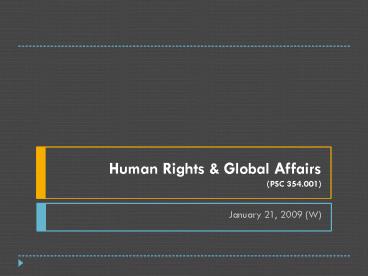Human Rights - PowerPoint PPT Presentation
1 / 17
Title:
Human Rights
Description:
Introducing the three core readings (books) Today's readings: ... Inalienable/incontrovertible. Rights can not be forfeit, suspended, or given up. Indivisible ... – PowerPoint PPT presentation
Number of Views:37
Avg rating:3.0/5.0
Title: Human Rights
1
Human Rights Global Affairs (PSC 354.001)
- January 21, 2009 (W)
2
Today
- Housekeeping
- Digital pictures
- Review of last week
- Course website
- Introducing the three core readings (books)
- Todays readings OByrne and Donnelly
- What are human rights?
- Theory and human rights
- Justifying human rights
3
Human Rights Global Affairs (PSC 354.001)
- Are you registered for this class?
- Attendance
- Additions social and economic rights/religious
freedom - The quiz
- Digital pictures
- Expectations
4
What are human rights?
- Human rights are rights held simply because one
is a human being. - Human rights describe a life in human dignity
framed in a language of rights. - Rights are trumps, superceding other
considerations (utility, interests, political
concerns, etc.) - Human possibility
- Human rights cover more than basic needs. They
aim to promote human possibilities in a
particular, morally defensible way.
5
Universal, Inalienable, Indivisible
- Inalienable/incontrovertible
- Rights can not be forfeit, suspended, or given
up. - Indivisible
- All rights are equal and depend upon each other.
- Universal
- Every human being enjoys the same rights.
- Rights create duties and obligations for others
- Human rights create obligations and go beyond the
moral claim of something being right they create
entitlements (having a right).
6
OByrne, introduction, 1-25
- Human rights as a discipline in its own right,
2 - Human rights research should improve the human
condition, 3 (is there a conflict with the
academic ethos of unbiased research?) - Book focuses primarily on civil and political
rights, 11
7
OByrne, introduction, 1-25
- Human rights abuses today (p. 5-8)
- Ranking countries with regard to human rights
abuses - What does human rights research look like (p.
8-17)? - What should be included in human rights research?
What qualifies as a human rights abuse? - Focus on the key role of the state
8
OByrne, introduction, 1-25
- Theory and Human rights, 17
- Theories of human nature because violations are
committed by individuals (next week) - Theories of society because violations occur in
specific social contexts. - Theories of ethics because we need to understand
why violations are wrong. - Theories of politics because the state plays a
central role in acts of commission or omission. - Theories of modernization because we face a
world of simultaneous human rights progress and
atrocities.
9
Donnelly, introduction and ch. 1
- Human rights the rights that one has because
one is human, 7 - Human rights are NOT granted by the state.
- Human rights are
- Inalienable
- Equal
- Universal
- Indivisible
10
Donnelly, introduction and ch. 1
- Human rights are not the same as abstract values,
11 - To have the right significantly changes the
relationship between rulers and ruled. - Human rights are not simply legal rights.
- Example LGBT community frequently appeals to
human, not legal rights, 12 - Legal rights are based on positive law.
11
Donnelly, introduction and ch. 1
- How do rights work?
- A right is an entitlement. It is not simply a
benefit or a desirable outcome. - Assertive exercise to claim a right
- Active respect to consider a right
- Objective enjoyment.
- Human rights violations constitute a special
class of injustice.
12
Donnelly, introduction and ch. 1
- Human rights and human nature
- How can we defend human rights?
- How can we justify human rights?
- Why do those defenses (based on ethics or
religion) of human rights sometimes fail? - How does being human create rights? (Donnelly,
p. 13). - Possible answers
- Human needs (rejected by Donnelly, p. 14)
- Life in dignity Mans moral nature prescriptive
account of human possibility
13
What is essential human nature?
- Physical needs
- Derives a definition of human rights from the
scientific study of what humans require for
survival. - Weakness neglects dignity and possibility.
- Mental and moral needs
- Shifts attention away from what we are now to
what we could be in the future. - Weakness No agreement on human nature and
possibilities. - Capacity to suffer and feel compassion
- Shifts attention away from being human to issues
of suffering and compassion. - Weakness Focus on pain, rather than human
possibility.
14
Human possibility
- Donnelly Human nature is a social project and
more than a presocial given. - Treat a person like a human being and you will
get a human being (Donnelly, p. 15). - Rights constitute individuals (not communities).
- Rights construct free and equal citizens.
15
From human nature to specific rights
- What is the content and essence of human nature?
(Donnelly, p. 16/17) - Ultimately, these philosophical theories will
always be contentious (because they are based on
assumptions). - However, we have a remarkable normative consensus
on the content of rights (expressed in the UDHR).
- A lack of foundations is not necessarily damaging
to the idea of human rights.
16
The Universal Declaration Model
- A Global Consensus?
- 30 min video on the creation of the Universal
Declaration of Human Rights, 1948 - Donnelly, chapter 2 Rights are
- Universal and Individual (p. 23-27)
- Indivisible (p. 27-33)
- States have the exclusive responsibility to
implement human rights at home (p. 33-37).
17
What you should know
- What are human rights?
- Where do human rights come from (normative and
empirical)? - What are some justifications for upholding human
rights? - What are contemporary challenges to the global
human rights movement? - What is the Universal Declaration of Human
Rights?































